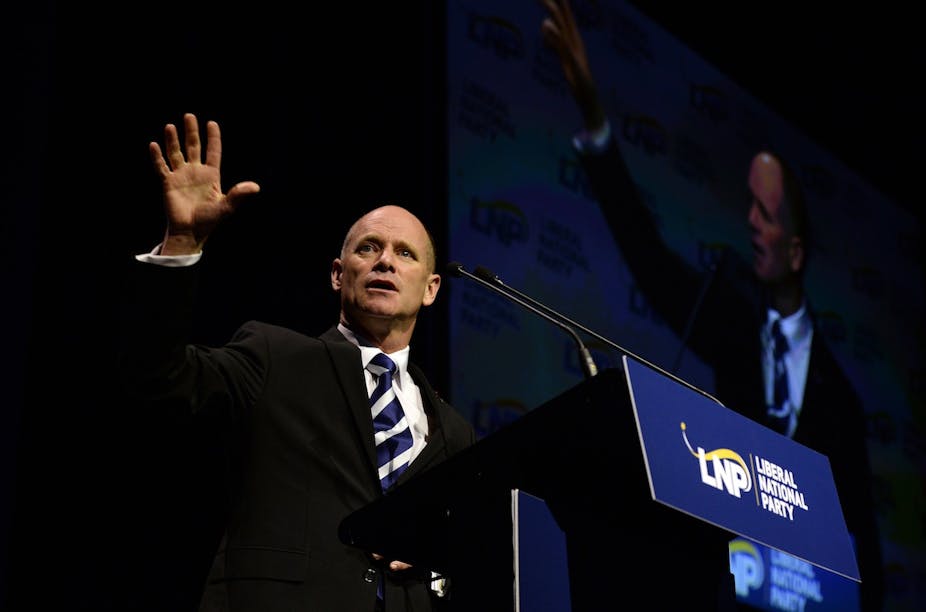Federal Treasurer Joe Hockey’s announcement that states will receive an incentive payment of 15% of asset sales if they invest the funds in infrastructure is good news for Queensland’s Newman government. As former state Labor premier Anna Bligh found, selling assets in Queensland is a challenge, especially if the sales are sprung upon an unsuspecting public.
LNP Premier Campbell Newman wants to sell off state-owned energy, port and water assets but has promised not to do so until after the next election, due in March 2015. In the meantime, his government has embarked upon a “conversation” on the subject with Queenslanders. Hockey’s announcement provides extra conversational ammunition.
Newman can now offer employment-creating infrastructure works in return for the sales. Assuming his government is returned, he can proceed with the sales and claim that, unlike Bligh, he has a mandate for his actions.
Turning the electorate around
Following recommendations from the Costello Commission of Audit, the Queensland LNP government flagged privatisation in the energy sector and ports. Treasurer Tim Nicholls commissioned four separate scoping studies on selling or leasing government businesses from J.P. Morgan, Lazard, Rothschild and Bank of America Merrill Lynch and ACIL Allen. The government has recently confirmed the scoping studies may not be released to the public.
Newman hopes voters can be persuaded of the wisdom of asset sales so that he can neutralise the opposition that Anna Bligh faced. In her case, public anger had two wellsprings: the sales themselves and the perception that she had acted without a mandate.
Bligh and her treasurer, Andrew Fraser, announced the sale of an estimated A$15 billion worth of state-owned assets soon after the 2012 state election. The step was taken in response to declining revenue as a result of the global financial crisis and the loss of the state’s AAA credit rating. The privatised assets included Queensland Motorways, the Port of Brisbane Authority, Forestry Plantations Queensland, the state’s rail freight network and the Abbot Point Coal Terminal. At the time, the LNP opposed the sales.
In a state where the government once owned butcher shops, there is strong attachment to state-owned assets. Not only did Bligh face hostility generated by the sales from both the public and some unions, she was also unable to overcome the perception that a betrayal of trust had occurred.
There were some obvious parallels with the public reaction to Julia Gillard’s broken promise on carbon tax. Female leaders seem to be treated much more harshly than men over such lapses. Bligh lost office with the largest swing against a government ever recorded in Australia.
Building a “mandate”
Newman hopes to avoid a similar backlash by establishing an electoral mandate for the sales. Mandate claims are relatively clear cut in Queensland where there is a single-chamber parliament. In Canberra, government claims to have a mandate to legislate are often contested by minor parties and the opposition who argue that they have an equal mandate to block legislation in the Senate.
Clearly the Newman government believes that by announcing asset sales well before the election it can avoid the breach of trust that turned voters against Bligh. It will also be able to use Hockey’s incentive payment to appease a lukewarm public.
With a 74-seat majority and a feeble opposition, Newman’s government is confident of being able to claim a mandate for asset sales after the next election. Nevertheless there is evidence of public dissatisfaction with its performance, which must be making some backbenchers jittery. The former solicitor-general, Walter Sofroniff, and former corruption commissioner Tony Fitzgerald have been highly critical of Attorney-General Jarrod Bleijie. Health Minister Lawrence Springborg faces the threat of mass resignation by senior public health doctors.
Labor gained a 16% swing in the Redcliffe by-election on February 22. This is much more than the average by-election swing of 5.3% against governments reported by election analyst Antony Green. Some of the Redcliffe swing can be explained by the circumstances that led to the by-election: the resignation of former LNP Member Scott Driscoll after the parliament’s ethics committee recommended his expulsion from the House. Some of it must, however, be attributed to dissatisfaction with the Newman government.
The issue of asset sales featured in the Redcliffe campaign. One nervous backbencher, Sean Choat (Ipswich West), has already promised to cross the floor on the issue. Labor, the unions, the Palmer United Party (PUP) and Katter’s Australian Party (KAP) have all said they will oppose asset sales. It will be interesting to see if Hockey’s offer causes any of them to change their mind.

